BMW X1 vs Hyundai Tucson Hybrid – Differences & Prices Compared
Compare performance, trunk space, efficiency, and price at a glance.
Find out now which car suits you better – the BMW X1 or the Hyundai Tucson Hybrid?
The BMW X1 (SUV) comes with a Gasoline engine and Automatic transmission. In comparison, the Hyundai Tucson Hybrid (SUV) features a Hybrid engine and Automatic transmission.
If you're looking for more power, decide whether the 312 HP of the BMW X1 or the 231 HP of the Hyundai Tucson Hybrid better fits your needs.
The BMW X1 offers a fuel efficiency of 23 mpg, compared to 38 mpg for the Hyundai Tucson Hybrid.
Price-wise, the BMW X1 starts at 41400 $, while the Hyundai Tucson Hybrid is available from 33500 $. Compare all details and see which model fits your lifestyle best!
The BMW X1 and Hyundai Tucson Hybrid cater to different ends of the luxury and efficiency spectrum in the compact SUV market. The BMW X1 offers a sportier driving experience with its agile handling and premium interior finishes, appealing to those who prioritize brand prestige and driving dynamics. On the other hand, the Hyundai Tucson Hybrid stands out with its impressive fuel economy and modern technological features, making it an appealing choice for environmentally-conscious drivers seeking value without sacrificing style.
BMW X1
The BMW X1 stands out in the compact luxury SUV segment with its impressive balance of style and practicality. This vehicle offers an upscale interior and advanced technology features, making it a favored choice for those seeking both comfort and innovation. Its nimble handling and efficient powertrain provide a dynamic driving experience, appealing to urban commuters and adventure seekers alike.
details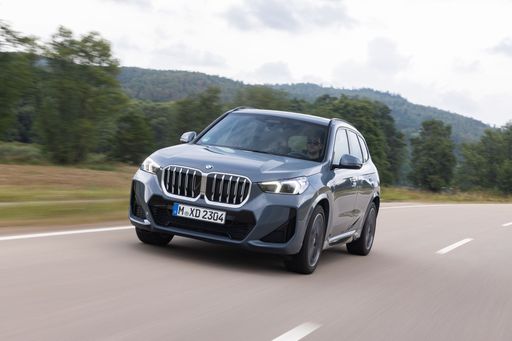 @ press.bmwgroup.com
@ press.bmwgroup.com
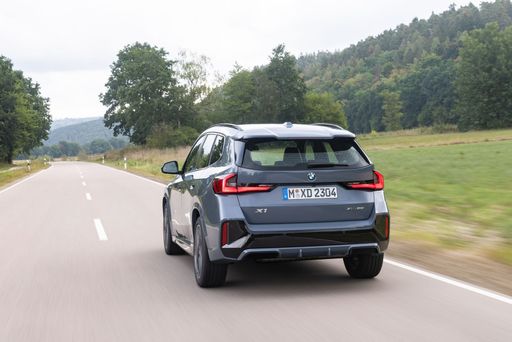 @ press.bmwgroup.com
@ press.bmwgroup.com
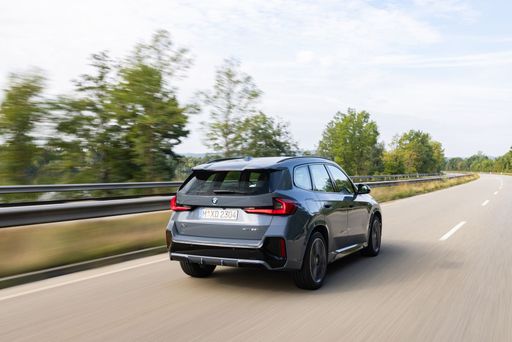 @ press.bmwgroup.com
@ press.bmwgroup.com
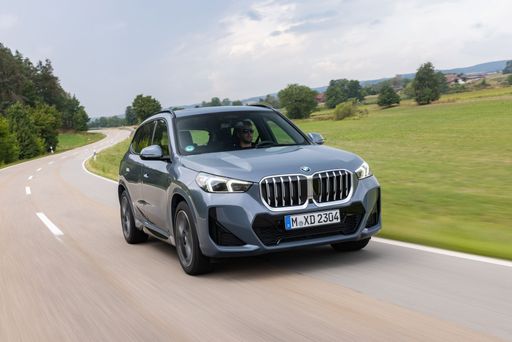 @ press.bmwgroup.com
@ press.bmwgroup.com
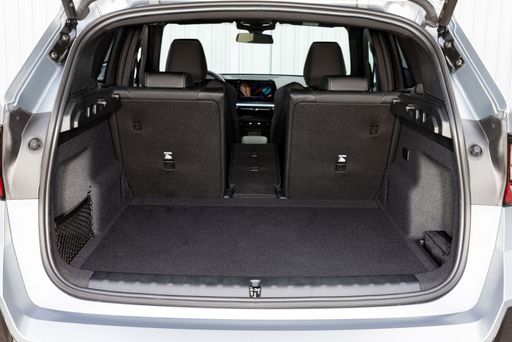 @ press.bmwgroup.com
@ press.bmwgroup.com
Hyundai Tucson Hybrid
The Hyundai Tucson Hybrid combines eco-friendly performance with a sleek, modern design, making it an ideal choice for environmentally-conscious drivers who don't want to compromise on style. It offers a smooth and responsive driving experience, enhanced by its advanced hybrid powertrain that shifts seamlessly between electric and gasoline modes. Inside, the Tucson Hybrid boasts a spacious and tech-forward cabin, providing a comfortable and connected journey for all passengers.
details @ hyundai.news
@ hyundai.news
 @ hyundai.news
@ hyundai.news
 @ hyundai.news
@ hyundai.news
 @ hyundai.news
@ hyundai.news
 @ hyundai.news
@ hyundai.news
A Battle of Compact SUVs: BMW X1 vs. Hyundai Tucson Hybrid
As the demand for versatile and fuel-efficient SUVs continues to rise, the market sees stiff competition among the leading brands. Two such contenders that have caught the public’s eye are the 2025 BMW X1 and the Hyundai Tucson Hybrid. Both offer distinct features tailored to meet the diverse needs of modern drivers. Let’s delve into their technical aspects and innovations to better understand what sets them apart.
Design and Dimensions
The design of an SUV can determine more than just aesthetics; it affects practicality and drivability. The BMW X1 presents itself with a sleek, compact body measuring 177.4 inches in length and 72.6 inches in width, offering a height of 64 inches. Its well-balanced dimensions promise an elegant yet robust presence suitable for both city streets and rugged trails.
On the other hand, the Hyundai Tucson Hybrid is slightly larger at 182.7 inches in length and 73.4 inches in width with a height of 66 inches, giving it a more commanding road presence. The Tucson's additional size might translate into slightly better interior space, enhancing comfort for passengers.
Power and Performance
When it comes to performance, the BMW X1 is powered by a 2.0-liter gasoline engine delivering a formidable 241 to 312 horsepower and a torque of 295 lb-ft. Paired with an automatic transmission and all-wheel drive, this SUV promises a spirited driving experience with an impressive fuel economy of 23 mpg in the city and 31 mpg on the highway.
Conversely, the Hyundai Tucson Hybrid opts for a 1.6-liter hybrid engine that produces 231 horsepower and a torque of 258 lb-ft. Its hybrid nature allows it to excel in fuel efficiency, boasting 37 to 38 mpg in both city and highway conditions. While the Tucson may not match the raw power of the X1, its fuel economy will appeal to the environmentally conscious driver.
Technology and Innovations
The modern SUV driver expects advanced technology and innovations, and neither model disappoints. The BMW X1 is equipped with cutting-edge driver assistance systems, a state-of-the-art infotainment system, and luxurious finishes that elevate the driving experience. Its innovation is in its fine balance of technology and performance.
The Hyundai Tucson Hybrid, however, stands out with its commitment to eco-friendliness without compromising on tech. It integrates advanced hybrid technology seamlessly with interactive infotainment systems and modern comfort features, providing an impeccable balance of sustainability and technological advancement.
Conclusion: Choosing Your Champion
The choice between the BMW X1 and Hyundai Tucson Hybrid boils down to individual priorities. If raw power and a dynamic driving experience are what you seek, the BMW X1 is a compelling choice. However, if fuel efficiency and an environmentally friendly ride top your list, the Hyundai Tucson Hybrid is hard to beat with its advanced hybrid technology and excellent fuel economy.
Ultimately, both SUVs deliver quality and innovation, which ensures whichever option you choose, you’ll hit the road with a vehicle that meets the demands of modern driving while also mirroring your individual style and needs.

|

|
|
|
|
Costs and Consumption |
|
|---|---|
|
Price
41400 - 50800 $
|
Price
33500 - 41300 $
|
|
FuelEconomy City
23 mpg
|
FuelEconomy City
37 - 38 mpg
|
|
FuelEconomy Hwy
31 MPG
|
FuelEconomy Hwy
36 - 38 MPG
|
|
Electric Range
-
|
Electric Range
-
|
|
Battery Capacity
-
|
Battery Capacity
-
|
|
Fuel tank capacity
14.30 gal
|
Fuel tank capacity
13.70 gal
|
Dimensions and Body |
|
|---|---|
|
Body Type
SUV
|
Body Type
SUV
|
|
Seats
5
|
Seats
5
|
|
Doors
-
|
Doors
-
|
|
Curb weight
3750 - 3790 lbs
|
Curb weight
3770 - 3919 lbs
|
|
Trunk Volume
-
|
Trunk Volume
-
|
|
Length
177.2 - 177.4 in.
|
Length
182.7 - 184.1 in.
|
|
Width
72.60 in.
|
Width
73.40 in.
|
|
Height
64 in.
|
Height
66 in.
|
Engine and Performance |
|
|---|---|
|
Engine Type
Gasoline
|
Engine Type
Hybrid
|
|
Transmission
Automatic
|
Transmission
Automatic
|
|
Drive Type
All Wheel
|
Drive Type
All Wheel
|
|
Power HP
241 - 312 HP
|
Power HP
231 HP
|
|
Torque
295 lb-ft
|
Torque
258 lb-ft
|
|
Number of Cylinders
-
|
Number of Cylinders
-
|
|
Engine Displacement
2 L
|
Engine Displacement
1.60 L
|
|
Gears
-
|
Gears
-
|
General |
|
|---|---|
|
Model Year
2025
|
Model Year
2025
|
|
Brand
BMW
|
Brand
Hyundai
|
BMW X1
Exploring the 2025 BMW X1: The Evolution Continues
The 2025 BMW X1 solidifies its position as a leading choice in the luxury compact SUV segment, offering a compelling blend of style, technology, and performance. With dynamic enhancements, this iteration marks a significant evolution from its predecessors. Let's delve into the new features and technical specifications that define this latest version.
Performance That Impresses
Under the hood, the 2025 BMW X1 boasts two robust gasoline engine options, tailored to cater to different driving preferences. For those seeking maximum power, the 312 HP version provides an exhilarating drive, supported by a torque of 295 lb-ft. This powerhouse pairs with an automatic transmission system, ensuring smooth gear transitions and enhancing the all-wheel-drive experience.
For drivers preferring a slightly less aggressive yet efficient engine, the 241 HP version still delivers impressive acceleration and robust performance. Regardless of the engine choice, both versions feature a 2.0-liter engine displacement, optimizing fuel efficiency while maintaining a thrilling drive.
Efficiency That Counts
The BMW X1 does not compromise on fuel economy. With a city fuel economy rating of 23 mpg and a highway rating of 31 mpg, the SUV strikes an excellent balance between performance and efficiency. This allows drivers to enjoy longer journeys with fewer fuel stops, courtesy of a 14.3-gallon fuel tank capacity.
Design and Dimensions
In terms of design, the 2025 BMW X1 maintains its sleek and aerodynamic presence, measuring at a length of 177.4 inches, a width of 72.6 inches, and a height of 64 inches. The intelligently crafted dimensions contribute to its distinct road presence while optimizing interior space. Comfortably seating up to five passengers, the interior promises luxury and spaciousness in equal measure.
Innovative Features Enhance the Experience
BMW’s commitment to innovation is evident in the X1's advanced technology package. Drivers and passengers are treated to an array of smart features designed to enhance comfort, safety, and entertainment on every journey. From state-of-the-art infotainment systems to adaptive safety features, the 2025 BMW X1 ensures that every drive is enjoyable and secure.
Conclusion
The 2025 BMW X1 exemplifies modern SUV excellence, blending performance, efficiency, and advanced technology. Its refined design, coupled with powerful engine options, sets a new standard in its class. For discerning drivers seeking a compact luxury SUV that excels in both urban settings and open roads, the BMW X1 remains an outstanding choice.
Hyundai Tucson Hybrid
The All-New Hyundai Tucson Hybrid: Where Performance Meets Efficiency
The Hyundai Tucson Hybrid has long been a favorite for those seeking the perfect blend of practicality and innovation in an SUV. With the 2025 model year, Hyundai continues to push the envelope, offering a range of improvements in the Tucson Hybrid lineup. With impressive technical specifications and cutting-edge innovations, the Tucson Hybrid is set to make waves in the hybrid SUV market.
Exhilarating Performance and Efficiency
Under the hood, the Hyundai Tucson Hybrid features a robust 1.6-liter turbocharged hybrid engine that delivers an impressive 231 horsepower and 258 lb-ft of torque. These figures provide drivers with an energetic and responsive driving experience, whether navigating city streets or cruising on the highway.
The hybrid system is complemented by an automatic transmission, ensuring smooth gear shifts for an enjoyable ride. Coupled with its all-wheel-drive capability, the Tucson Hybrid delivers excellent traction and stability, making it well-suited for a variety of terrains and weather conditions.
Fuel Economy: Leading the Way
Fuel economy is a standout feature for the Tucson Hybrid. City driving yields around 37-38 mpg, while highway efficiency is rated at 36-38 mpg. This balance of power and efficiency is a testament to Hyundai's commitment to eco-friendly innovation without compromising on performance.
Design and Dimensions
The Tucson Hybrid strikes a bold presence with dimensions that speak to both style and practicality. Its body is designed with contemporary lines and a modern aesthetic, measuring between 182.7 and 184.1 inches in length, 73.4 inches in width, and 66 inches in height. This spacious design accommodates up to five passengers comfortably, making it an ideal choice for families and adventurers alike.
Cutting-Edge Features and Technology
Hyundai has equipped the Tucson Hybrid with an array of innovative features designed to enhance the driving experience. The model comes with advanced safety technologies and an infotainment system that keeps drivers connected and entertained. The vehicle's ergonomic design also ensures that every control is within easy reach, prioritizing comfort and convenience.
Model Variants Designed to Impress
Within the Tucson Hybrid lineup, the variants, including options like the Hyundai Tucson Hybrid 455997, 455998, 455999, and 456000, all come standard with all-wheel drive and possess the same impressive 231 HP output. These models offer slight variations to meet the specific needs and preferences of customers.
The Future of Hybrid SUVs
As hybrid technology continues to evolve, the Hyundai Tucson Hybrid stands at the forefront, representing the future of hybrid SUVs. Its combination of power, efficiency, and advanced features makes the Tucson Hybrid a compelling choice for discerning drivers who want to make a smart, sustainable choice without sacrificing performance.
In summary, the Hyundai Tucson Hybrid ticks all the right boxes for those looking for an efficient, powerful, and technologically advanced SUV. It’s a testament to Hyundai's dedication to delivering vehicles that exceed expectations and offer unmatched value in the competitive automotive market.
How much does the BMW X1 cost?
The BMW X1 starts at 41400 $.
The prices and data displayed are estimates based on USA list prices and may vary by country. This information is not legally binding.
